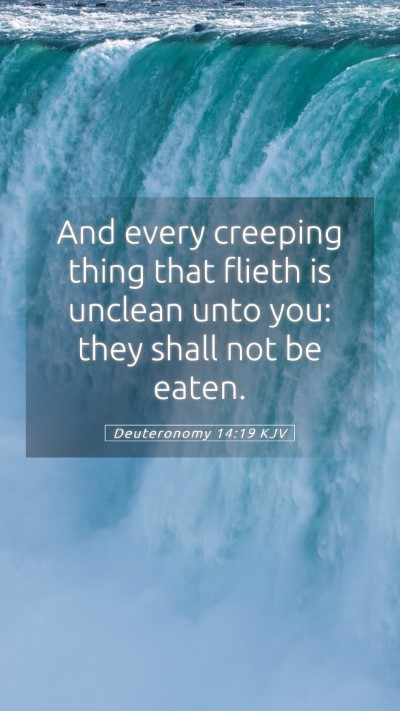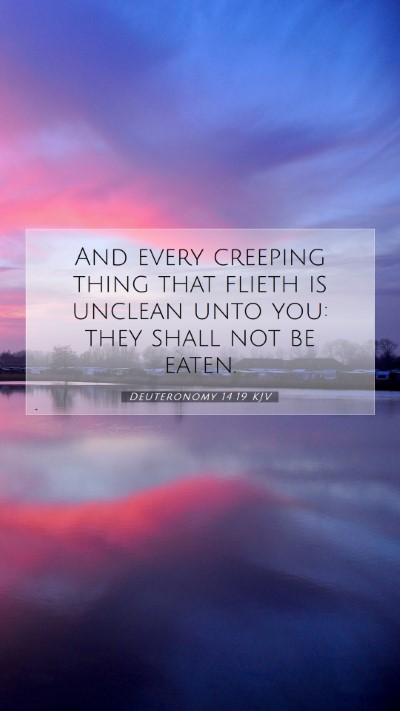Bible Verse Meaning of Deuteronomy 14:19
Context: Deuteronomy 14:19 discusses dietary laws and the clean and unclean animals that the Israelites were permitted to eat. The verse states, "And every creeping thing that crawls on the earth is an abomination. It shall not be eaten." This reflects God's instructions on maintaining holiness and purity among His people.
Summary and Analysis
Interpreting Deuteronomy 14:19 involves understanding its implications on spiritual cleanliness and the significance of dietary laws in ancient Israel. The verse particularly emphasizes that creeping things, likely referring to various insects and small animals, were seen as unclean and unworthy for consumption. Here, we shall explore the insights derived from public domain commentaries to deepen our Bible verse understanding.
Insights from Matthew Henry
Matthew Henry emphasizes that these dietary laws were part of the covenant that God made with Israel, signifying their separation from other nations. He interprets the abominations as symbolic of spiritual uncleanness, indicating that the Israelites should maintain a distinct identity. The limitations on certain foods served a greater purpose than mere dietary restrictions; they were signs of deeper spiritual truths. According to Henry, the observance of these laws promoted holiness and a continuous reminder of dependence on God's commandments.
Insights from Albert Barnes
Albert Barnes notes that this prohibition serves as a lesson in the importance of adhering to God's commands and recognizing the need for spiritual discernment. He reasons that although the Old Testament dietary laws are not binding on Christians today, they highlight the core principle of holiness and living a life set apart from sin. Barnes encourages a reflective application of this verse, suggesting that believers should consider how their choices reflect their commitment to God’s purposes.
Insights from Adam Clarke
Adam Clarke further expands on the agricultural and health implications of these dietary laws, pointing out that abstaining from certain animals not only had spiritual significance but also practical benefits. Clarke articulates that understanding why specific creatures are labeled as ‘unclean’ reveals deeper insights into divine order and creation. He posits that such regulations were instrumental in establishing a disciplined community dedicated to God's service.
Application of the Verse
For modern readers, Deuteronomy 14:19 invites contemplation on how dietary choices and lifestyle can reflect one's faith. It urges believers to think critically about their decisions and their alignment with biblical teachings. Whether discussing b Bible study groups or engaging in online Bible study, this verse serves as a foundational discussion point for faith expressions in daily life.
Related Bible Cross References
- Leviticus 11:42-43 - Further elaboration on clean and unclean animals.
- Isaiah 66:17 - The consequences of eating unclean things in God's judgment.
- Matthew 15:11 - Jesus’ teaching on what defiles a person, shifting the focus from the physical to the spiritual.
Conclusion
Understanding Deuteronomy 14:19 goes beyond mere dietary restrictions; it calls for a comprehensive examination of personal holiness and relationship with God. By engaging with various Bible study tools, one can explore scriptural truths, enrich their Bible verse commentary, and foster a meaningful dialogue about the relevance of Scripture today.


